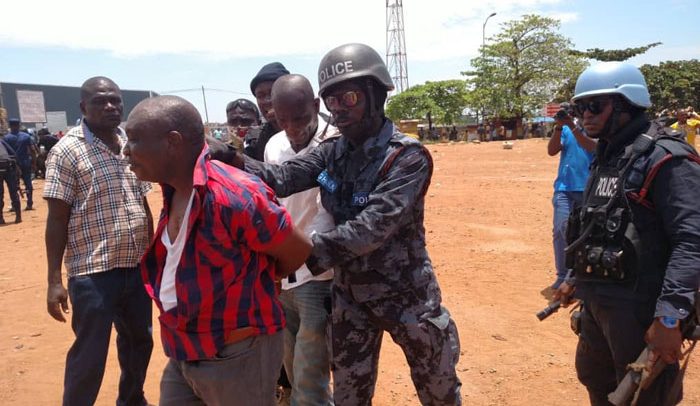One of the executives being arrested by the police
Confusion marred yesterday’s intended peaceful sit-down strike by members of the petroleum tanker drivers’ union when their colleagues, Liquefied Petroleum Gas (LPG) tanker drivers boycotted the strike.
This created confusion between the two groups, as the petroleum haulage drivers attempted to stop the gas haulage drivers from loading at the Tema Oil Refinery (TOR).
But for the intervention of the National Security personnel and police, the standoff could have turned bloody.
The security officers brought the situation under control owing to the threat it posed to the refinery.
Police fired teargas and rubber bullets into the crowd to disperse them and three executive members of the tanker drivers’ union were arrested in the process.
Earlier, an intervention from a national security operative, who purportedly pulled a gun on the drivers, escalated the situation but the police swiftly intervene to calm nerves.
Deputy Superintendent of Police (DSP), Joseph Benefo Darkwah, Public Relations Officer (PRO) of the Tema Regional Police Command, who confirmed the arrest of the three top officers of the tanker drivers union to the media, explained that the lawlessness which characterized the demonstration compelled the police to move to safeguard the refinery and maintain law and order.
Speaking to the media, Chairman of the Ghana Petroleum Tanker Drivers Union, George Nyaunu, accused the National Petroleum Authority (NPA) of trying to break their front instead of solving their problems.
According to him, the alleged sabotage by NPA would not stop them, adding that they would continue to use all legal means to address the problems.
He indicated that they would ensure that no driver loads any petroleum product from any of the six oil loading points in Tema until the authorities address their concerns, calling on the union members to remain calm.
Members of the Ghana Petroleum Tanker Drivers Union took the action due to what they termed as poor conditions of service, including non-payment of salaries and what they termed underground shortage which is deducted from the accounts of drivers.
Members of the union last week issued a one-week ultimatum to the NPA and the government to implement an MoU they all signed to improve their conditions of service.
Government’s failure to address their concerns led to the strike action.
Attempts by their national executives to convince them to rescind their decision proved futile, as the angry tanker drivers chased out some of their colleagues who had gone to the various oil loading points to load their tankers.
However, unconfirmed reports as at press time indicated that the drivers had agreed to call off the strike.
From Vincent Kubi, Tema


